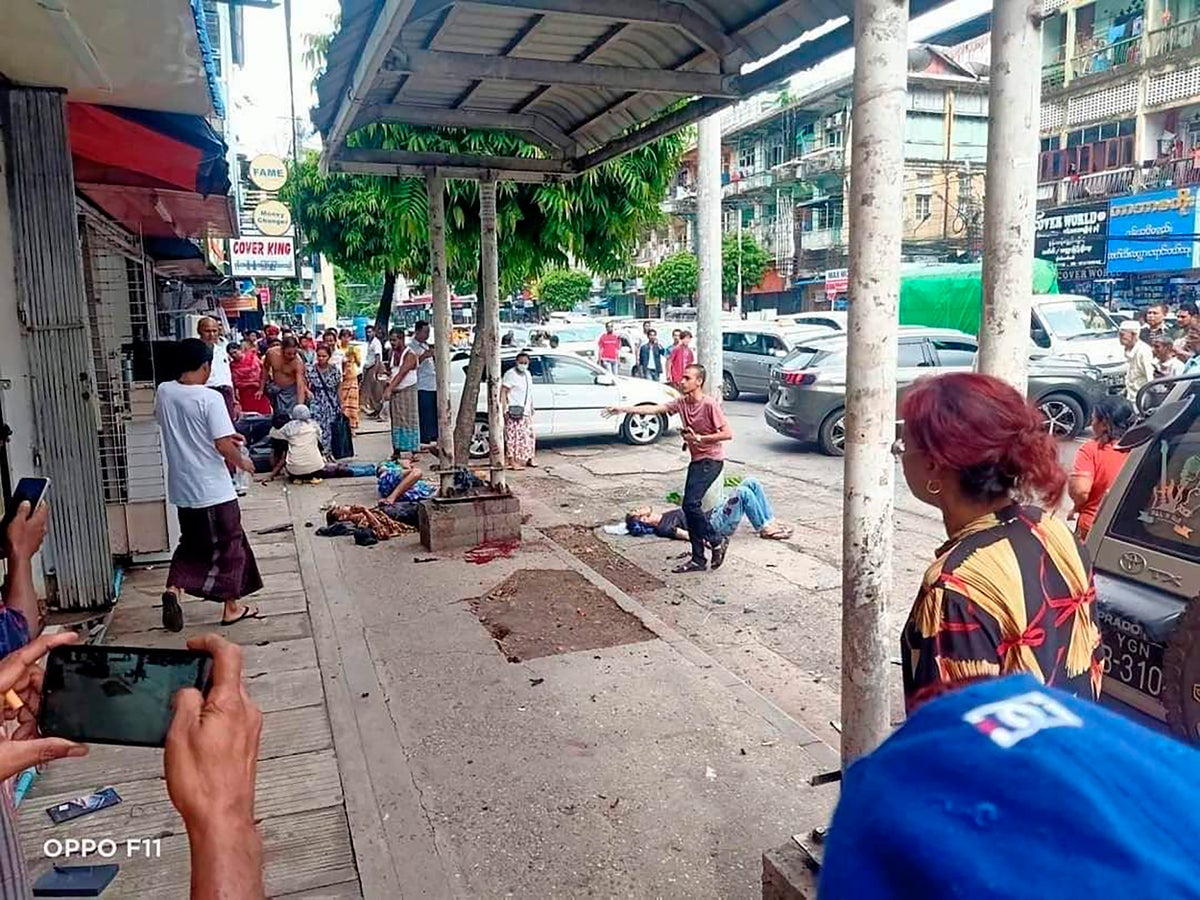
Myanmar’s military government and its opponents traded accusations over a bomb that exploded Tuesday in the middle of the country’s largest city, Yangon, killing one and wounding nine others.
A story in Wednesday’s edition of The Global New Light of Myanmar, a state-run newspaper, linked the blast to the armed movement that opposes last year’s military seizure of power from the elected government of Aung San Suu Kyi.
The report blamed the People’s Defense Forces, the opposition movement's armed wing, but did not supply any evidence.
It said the attack was made with a “handmade bomb planted by PDF terrorists at a bus stop” roughly one block from the Sule Pagoda, a city landmark.
A spokesperson for the self-styled National Unity Government, the main opposition body that loosely commands the PDF and its various local units, pinned the blame on the military government.
“The brutal genocidal military has been carrying out senseless bombings and killings against its own civilian population across Myanmar,” said a statement posted online by Sasa, the NUG’s Minister of International Cooperation.
Myanmar has been in turmoil since last year’s army takeover sparked widespread nonviolent protests that were quashed with lethal force by the army and police. In turn, opponents of military rule took up arms and are now conducting an active insurgency in many parts of the country.
Military operations by government forces in eastern and northwestern Myanmar have killed hundreds of civilians, according to groups including Amnesty International.
A separate, detailed count by the Assistance Association for Political Prisoners says 1,876 civilians, mostly in cities and towns, have been killed by the security forces.
Photos and videos of Tuesday's bombing circulated on social media showing the injured people lying on the ground with blood on the pavement. State media said the blast occurred at 3:20 p.m. and a 30-year-old man died of wounds in his chest and abdomen.
The opposition NUG’s Defense Ministry in a Wednesday statement said the ruling military “have sought to place blame on ethnic resistance groups and revolutionary forces in similar incidents in the past.”
Urban guerrillas are part of the resistance movement, carrying out targeted killings of people associated with the military and bombings of establishments with official ties. But PDF-affiliated groups in Yangon posted statements on their Facebook pages denying involvement in Tuesday’s blast and accusing the military of staging a provocation.
They dismissed as fake a claim of responsibility from a “People’s Defence Force Yangon,” a little-known group that issued an unusual call last year threatening the lawyers defending Suu Kyi in trials on charges brought against her by the military. No other opposition group supported that position.
The military government brands its opponents as terrorists in a bid to dent their widespread popularity. Wednesday’s newspaper report said the PDF received “financial assistance to launch bombing attacks."
“They also committed bomb attacks using handmade bombs on public roads, streets, bus terminals and bus stops,” it added.
Another fatal bombing occurred Tuesday at a two-story education office in Naung Cho township in Shan State in eastern Myanmar, for which state media likewise blamed the PDF and the NUG.
The Global New Light of Myanmar said a headmistress died and six educational personnel and a civil servant were injured. The blast occurred as state schools were preparing for their seasonal reopening.
The school system has been a battleground between the military government and its foes, who generally have pressed for a boycott as a sign of rejection of army rule.
“The number of children out of school in Myanmar has more than doubled in two years, with about half of the country’s children now missing out on a formal education due to COVID-19 school closures and escalating insecurity," the non-governmental organization Save the Children said in a statement issued Wednesday.
It noted that there were at least 260 attacks on schools between May 2021 and April this year, and that explosions in and around school buildings accounted for almost three quarters of that total.
“Attacks on schools, teachers, and students have surged over the past year due to the conflict, leaving many of them scared to return to the classroom and, in some cases, with no schools left to attend,” the group said.







